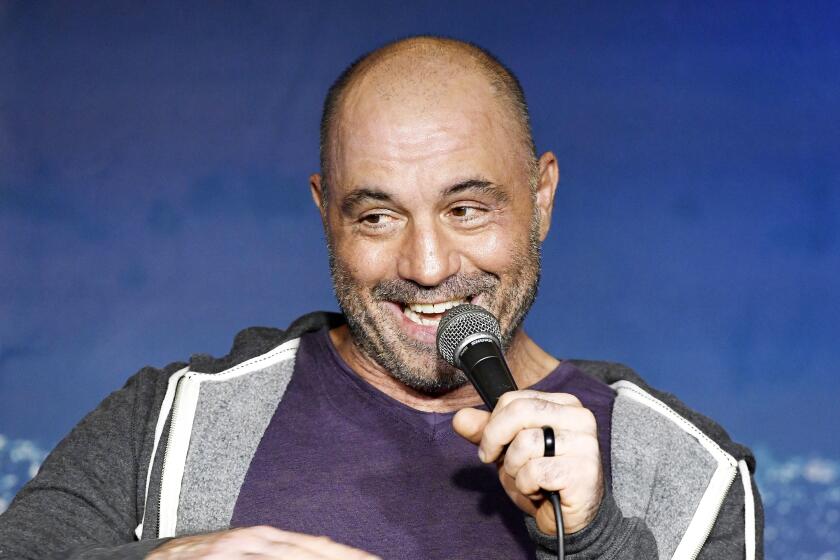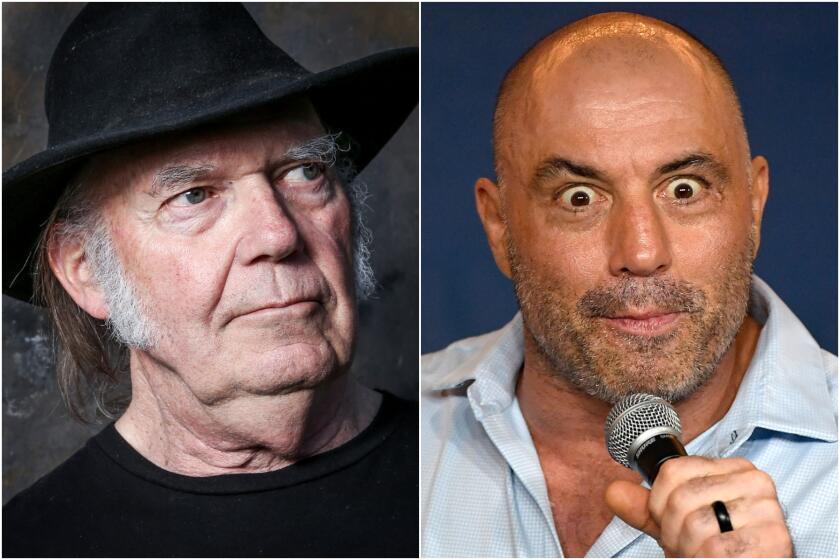From MTV to Spotify, Neil Young has never shied from waging war against powerful corporations
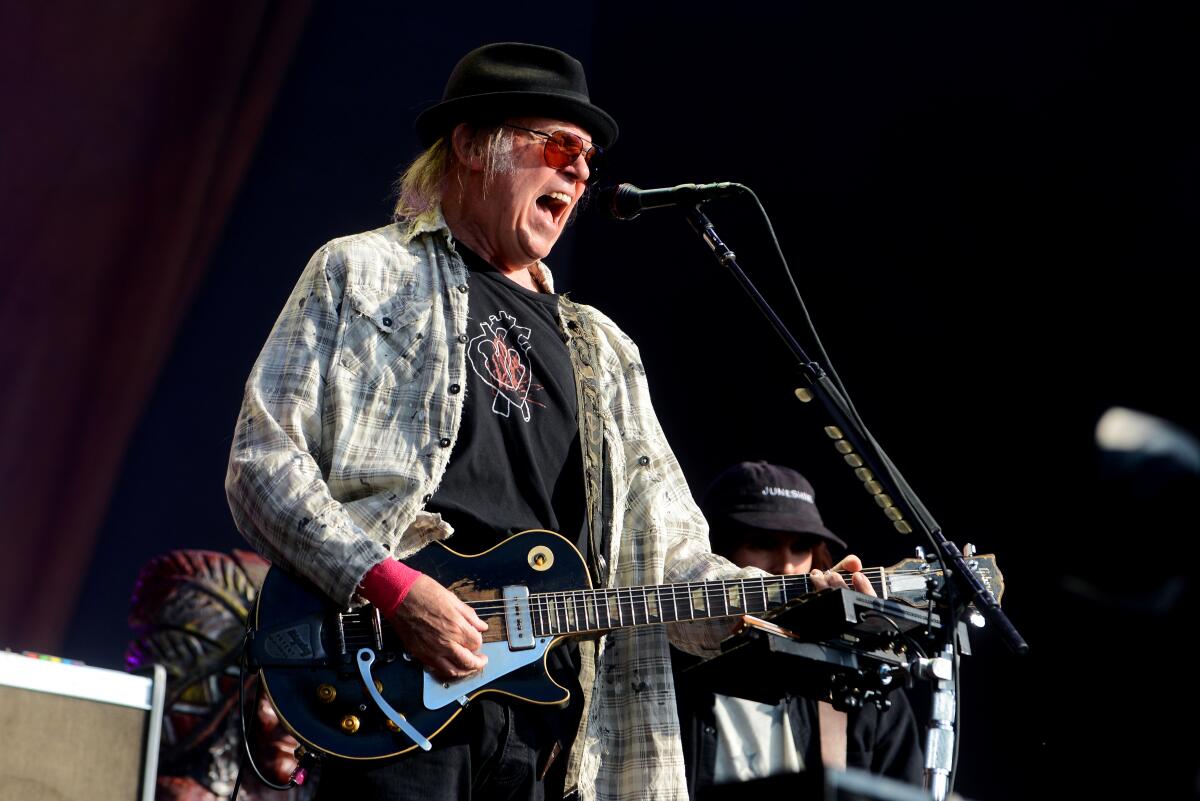
When Neil Young announced he was pulling his entire discography from music streaming giant Spotify over the platform’s alliance with podcaster and vaccine skeptic Joe Rogan, the beloved singer-songwriter explained in an open letter that he was taking a moral stand.
“I am doing this because Spotify is spreading false information about vaccines — potentially causing death to those who believe the disinformation being spread by them,” Young wrote, concluding, “They can have Rogan or Young. Not both.” Not long after, Spotify abided by his request and removed Young’s entire discography.
In issuing the statement, Young, 76, was commencing the most recent campaign in a decades-long artistic battle against corporate media and power structures that value profits over art.
Spotify paid millions to lure Joe Rogan but now faces pressure from more than 200 doctors to hold him to account for spreading misinformation about COVID vaccines on his podcast.
“Artists are manipulated by business all the time,” Young told a British radio interviewer in 1992, of his approach to handling his affairs. “A lot of artists are weak when it comes to their own direction and their own future. Many of them just put themselves in other people’s hands — and then feel frustrated that things aren’t turning out right.”
Over the decades, Young has made the news for indicting: MTV’s corporate ties; musical peers including Eric Clapton, Michael Jackson and the Rolling Stones for earning millions selling their music for commercials; record mogul David Geffen’s market-driven tastes; Monsanto and corporate control of family farms; the owner of Lionel trains for announcing its closure (Young ended up buying the company); the sonic inferiority of compact discs; and the ways in which tech companies have been willing to compromise on audio quality for bigger profit margins.
“Neil has this passionate belief in things, and when he believes in something he will take it to the end of the line,” says record producer and longtime publicist Bill Bentley, who worked with Young at Reprise Records and currently writes a column for the artist’s Neil Young Archives online hub. “I don’t think I’ve ever met another artist who is so single-minded about standing up for what he thinks is right. Neil doesn’t change his views in terms of what it’s going to cost him in sales or anything else.”
His discography confirms it. Starting as a folk singer in the activist 1960s, Young’s repertoire includes righteously indignant songs about institutional violence (“Ohio”), racial inequity in the South (“Southern Man”), religious extremism and violence (“Let’s Roll”) and political opportunism (“Let’s Impeach the President”). He’s even released a concept album about the dangers of biotechnology called “The Monsanto Years.”
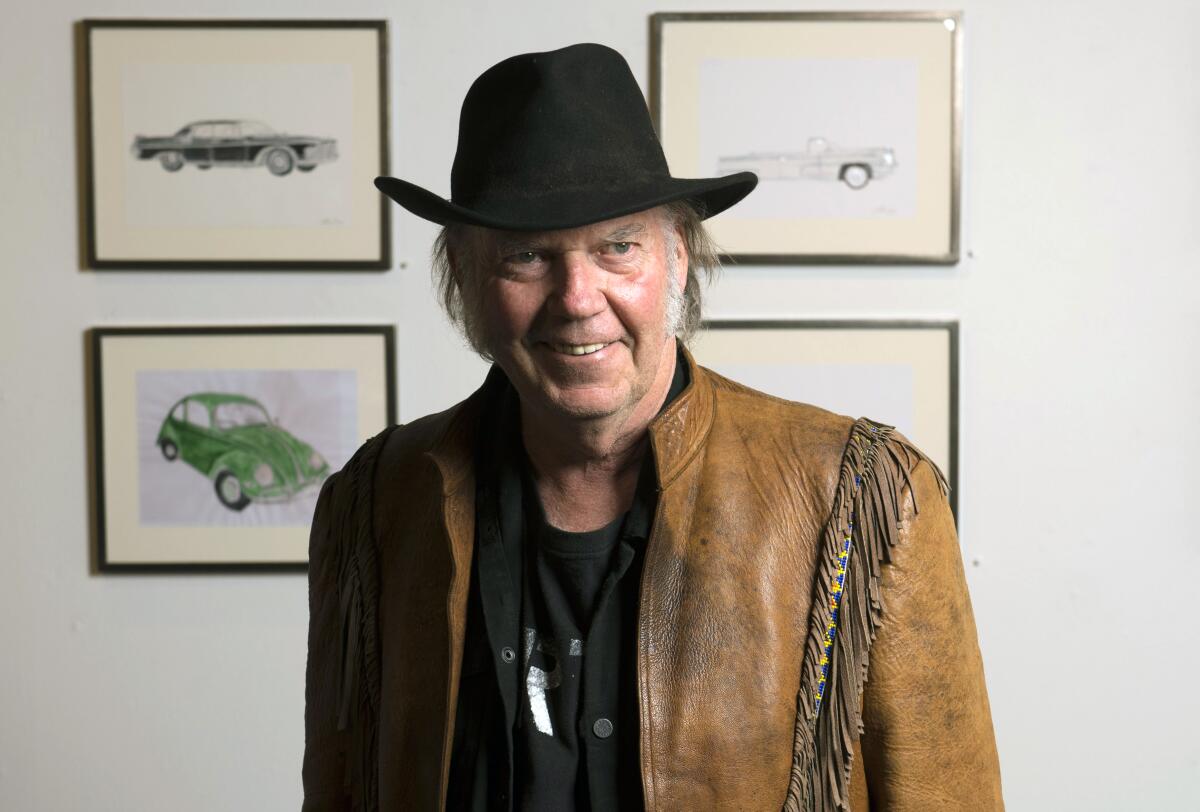
Young’s issue with Spotify, which is the world’s leading music streamer with more than 172 million paid subscribers, mirrors a similar skirmish he initiated in 1987 with cable network MTV. At the time, the then-video giant was the dominant force in popular music; being added to the channel’s rotation was a key in ensuring a song’s commercial success.
As a response to and a protest of that power, Young wrote a song called “This Note’s for You.” Drawing on an idea inspired by a “This Bud’s for you” ad campaign airing at the time, Young started the lyric while on a tour bus: “I ain’t singing for Pepsi / I ain’t singing for Coke.”
“The Rolling Stones were sponsored by Jovan perfume, Eric Clapton and Steve Winwood were selling beer, Michael Jackson had been bought by Pepsi for $15 million,” Young told interviewer Mark Rowland, as quoted in writer Jimmy McDonough’s 2002 authorized biography, “Shakey: Neil Young’s Biography.”
“He was grousing about the hyper-commercialization of pop music and the fact that marketers stuck their logos on tours, even though there was no specific relationship,” recalls Bob Merlis, former senior vice president of corporate communications for Warner Bros. Records. Merlis oversaw the “This Note’s for You” press campaign.
Neil Young fans are threatening to ‘uninstall Spotify’ after the streaming giant chose to stand by Joe Rogan, prompting Young to remove his music.
Young’s intent was to call out the disproportionate power that MTV had accrued both with consumers and advertisers. His team hired Julien Temple to direct the song’s video, which lampooned Jackson, Whitney Houston and Budweiser mascot Spuds MacKenzie. MTV rejected the clip. Outraged, Young penned an open letter.
The ensuing press attention earned Young an invitation to appear on a segment with MTV News’ Kurt Loder. Explaining why he would appear on a network he so vocally criticized, Young said, “You’re so big that if I don’t come down here, not only might I not get this video on, I might not get the next video on. How am I supposed to know?” MTV, Young concluded, “should be called television music, not music television.”
Eventually, MTV relented and aired the video, which ironically wound up winning video of the year at MTV’s 1989 Video Music Awards. “I still can’t believe that such a dumb little song helped resuscitate my career the way it did,” Young told writer Nick Kent.
Says Merlis, “He’s the definition — and I don’t mean this in a negative way — of righteous. He’s consistent in avoiding any possibility that he’d be perceived as a sellout. It’s baked into his DNA. He is incapable of being corrupted, and he’s his own man.” Adds Merlis with a laugh, “His band members would tell you that too — for better or, sometimes, worse.”
Less than a decade earlier, Young had faced an equally formidable cultural force: record mogul David Geffen. After being wooed away from his longtime home of Warner Bros. subsidiary Reprise Records after the release of his 1981 album “Re-ac-tor,” Young commenced work on his first Geffen album. At the time, Young was experimenting with electronic music — going so far as to collaborate with synth-driven punk band Devo for the 1982 movie “Human Highway.”
Naturally, the musical experience bled into Young’s next recording project, which, per the Geffen contract, afforded it a sizable budget.
Called “Trans,” the synth-driven new wave album featured Young filtering his voice on many songs through a Vocoder vocal distortion box and relying as much on synthesizers as his usual guitar. It flopped when it came out in 1982. His next album, with an equally impressive budget, was a simply recorded rockabilly-inspired album with his band the Shocking Pinks called “Everybody’s Rockin’.” Though the video for the single “Wonderin’” earned airplay on MTV, its impact certainly didn’t equal his work in the 1970s.
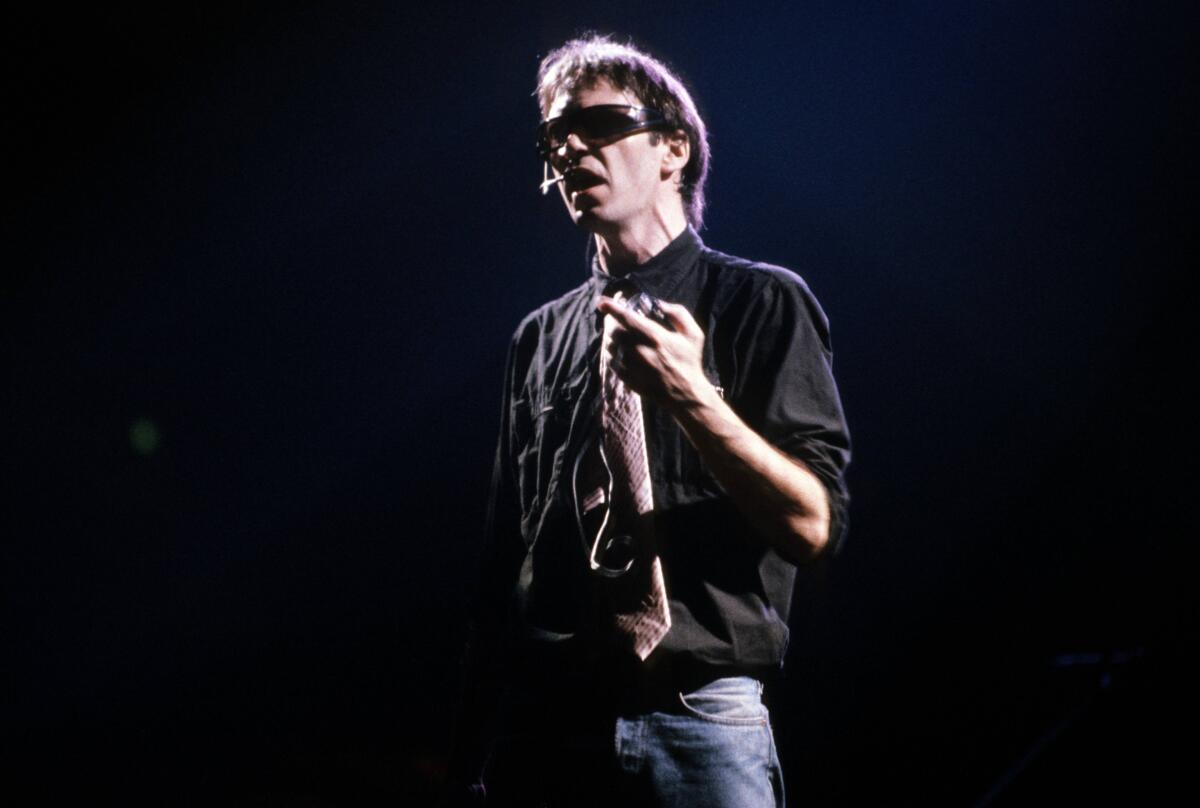
Angry that Young wasn’t delivering “Neil Young”-style music, in 1983 Geffen sued Young for more than $3.3 million. The suit described “Trans” and “Everybody’s Rockin’” as “not ‘commercial’ and … musically uncharacteristic of Young’s previous recordings.”
“David took it personally that I was making records on his label that weren’t selling,” Young told McDonough. Young later brushed off criticism that his Geffen recordings were self-indulgent, telling interviewer Tom Hibbert, “I made ‘Trans’ because I wanted to ... and if you don’t like that s—, fine.”
In response, Young countersued. Ultimately, the aggrieved parties dropped the suits and settled out of court. “I could understand where Geffen was coming from,” Young told McDonough. “He had a rough row to hoe. He wanted to make a million dollars — and I was in another world.”

Young has seldom tempered his beliefs, whether they offended liberals or conservatives. The news page on his Neil Young Archives site, after all, is called the NYA Times-Contrarian.
His own track record isn’t spotless. In 1985, as AIDS was overwhelming American gay communities, Young used a homophobic slur in an interview and said of gays and the virus, “You go to a supermarket and you see a f— behind the f— cash register, you don’t want him to handle your potatoes.”
During the 1990s, Young bemoaned the rise of compact discs and the loss of vinyl’s tactile nature. As file-sharing begat iTunes and the iPod era, Young set his sights on big tech, telling The Times in 2009, “Apple has made music into wallpaper.” He rejected the limits of MP3 sound quality and decried the ways in which the digital compression had ruined the experience of listening to music.
His response was an admirable, if windmill-tilting, entry into the tech sector with a portable digital music player called Pono and an accompanying online download store. Billed as a higher-fidelity portable player than the iPod — but yellow and triangular like a bar of Toblerone chocolate — Pono was financed in part with another recent innovation, crowd-funding. Upon its release in 2015, Pono became the subject of late-night monologues and online chatter, but hardly upended the tech landscape. Ars Technica’s review at the time called the Pono “a tall, refreshing drink of snake oil.” The company ceased operations in 2017.
Bentley says that regardless of the outcome of Young’s most recent stand, the singer’s tenacity remains as strong as ever.
“I don’t know where the Spotify war will end up — those kind of wars, in the end, nobody wins,” Bentley says. “But I do know Neil does not back down once he thinks he’s doing something that he feels is right.”
More to Read
The biggest entertainment stories
Get our big stories about Hollywood, film, television, music, arts, culture and more right in your inbox as soon as they publish.
You may occasionally receive promotional content from the Los Angeles Times.
